Your handbook for protecting yourself and your family from the dangers of air pollution (PM2.5)
Smog. PM2.5. Air pollution.
Words we are all familiar with. We’ve seen them flashing in the news, chatted about on the streets, and advertised at us from every pharmacy.
Air pollution, and the harmful side effects of constant exposure to it, is a harsh reality for many citizens around the world.
And for those of us living in Bangkok, air pollution is not going away anytime soon. Which leaves two choices: move to a less polluted city or learn how to cope with this lurking health threat.
Citydwellers typically live an urban lifestyle out of necessity, desire, or both. So leaving the city isn’t a realistic option for a lot of Bangkokians. And let’s face it: a lot of us love Bangkok and love our lives in this hectic yet charming metropolis.
For now, air pollution is here to stay and so are you. Instead of ignoring the problem or panicking over the dangers, we’re here to help you take back control of your health and your happiness.
Keep reading to learn all the must-know facts about air pollution: what it is, where it’s coming from, why it’s bad for you, how to protect yourself, and what steps you can take to decrease air pollution.
What Air Pollution is
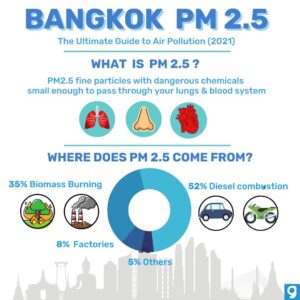
To understand why air pollution is harmful, you need to first understand what PM2.5 is.
PM2.5 refers to the size of particulate matter (PM) in the air. PM2.5 particles are smaller than 2.5 micrometers in diameter and can only be seen with an electron microscope. To compare, about 30-40 of these “fine” particles can fit in the width of one piece of human hair.
This is important for a few reasons.
Every time you take a breath of air with PM2.5, these particles are small enough to pass by the nose and throat and directly enter your lungs. From your lungs, PM2.5 can directly enter your circulatory system posing an even greater danger to your health.
These particles usually have harmful chemicals in them. So when it enters our bodies PM2.5 can cause or lead to illnesses and health problems, many which could be chronic and quite severe.
Not only are PM2.5 particles tiny but they are also light and linger in the air longer. Smog, or the dense visible haze of air pollution, can be caused by high concentrations of PM2.5. So large amounts of PM2.5 lingering in the air for days, sometimes weeks at a time only increases your chances of inhaling the harmful chemicals into your body.
Where it’s Coming From
PM2.5 particles come from all types of combustion. The main sources of PM2.5 are factories and power plants, exhaust emissions from motor vehicles, and construction dust.
Agriculture is another leading contributor of air pollution. Farmers in surrounding provinces often burn their fields after the harvest season to clear them of stubble, or crop residue, in preparation for farming new crops.
In Bangkok, the highest levels of air pollution usually happen in the cold season from November through February. During this time the air pressure changes and there’s significantly less wind to blow air pollutants away so a thick haze of smog often coats the city – a clear indicator of PM2.5 in the air.
Why it’s Bad for You
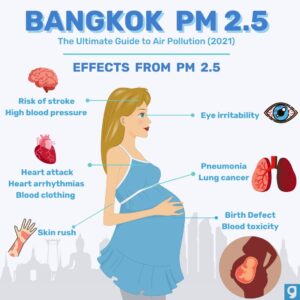
Short term and long term exposure to PM2.5 air particles can have harmful effects on both your physical and your mental health. And it’s not just causing that persistent “cold season” cough of yours.
Several body systems are at the most risk for being negatively affected by air pollution:
1. Lungs and respiratory system
The most likely and most common effects of air pollution are respiratory related illnesses, including asthma, due to lung inflammation caused by inhaling PM2.5.
PM2.5 has also been proven to cause inflammation of the lungs which can lead to pneumonia and even lung cancer.
2. Blood system
When PM2.5 is inhaled deeply into the lungs, the soluble parts of the particles enter the bloodstream directly. Harmful chemicals in the bloodstream could lead to a multitude of problems including high blood pressure, weakened blood vessel function, and blood clotting disorders. These health issues can lead to a higher risk for stroke and heart disease.
3. Heart and cardiovascular system
The negative chemicals introduced into your body through PM2.5 can affect heart rate, heart rate variability, and potentially increase the risk of heart arrhythmias, heart attacks, and other cardiovascular diseases.
4. Reproductive system
Pregnant women should be cautious of PM2.5 exposure because of the increased risk of birth defects. If the blood system is compromised by PM2.5 exposure in the form of blood toxicity, this could lead to direct harm to the fetus, especially during the first months of pregnancy.
The longer and more often you are exposed to PM2.5 the greater your risk of developing these and other chronic diseases. We also know, from various scientific studies that long term PM2.5 exposure can ultimately reduce your lifespan.
How to Protect Yourself
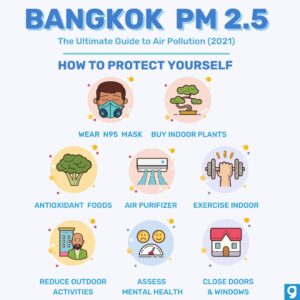
Air pollution affects everyone differently. Sensitive groups are more likely to experience the negative effects of air pollution and should take extra precautions while living in Bangkok. These groups include those with predisposed respiratory and cardiovascular disease, the elderly, children, and pregnant women.
Still, regardless of age or fitness level, no one can know for certain what effect regular exposure to air pollution is having on your body’s overall health. There are several actions you can take to limit your exposure to harmful particles and to protect yourself, your family and your immediate and long term health from air pollution’s negative effects.
Here are our top 8 ways to stop worrying about air pollution and get back to living your healthiest life in Bangkok:
1. Know your air quality
Stay up-to-date with how bad (or not!) the air outside actually is. You can check several websites or simply download a free app to see the air quality index score in your general location. For living in Bangkok and traveling around Asia the apps we love are AirVisual and Air Matters.
Guri Pro Tip: Check multiple websites or apps. Some apps use different air quality index scales. So a “safe” air quality number on one app might be labeled as “unhealthy” on another. Compare numbers from several sources for a broader idea of the air quality in your area. Of course, the best way to know the air quality wherever you’re located is to buy your own air quality monitor.
2. Wear a reusable N95 mask
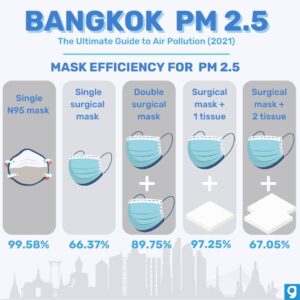
The easiest way to protect yourself from air pollution during your day-to-day activities is to always wear a mask whenever you are outside.
People wearing surgical masks in public is not an uncommon sight in Bangkok. Surgical masks aren’t ideal for long-term air pollution protection, though, for several reasons: there isn’t a seal around your mouth so you still breathe in polluted air, surgical masks don’t effectively filter PM2.5 and they are not reusable. Because of this, we only recommend wearing a surgical mask if you’re outside and forgot to grab your reusable mask, since some protection is better than nothing. But don’t be caught off guard!
The most protective masks to prevent inhaling PM2.5 particles are the ones with a label of at least N95. This number means the mask can filter out at least 95% of airborne particles larger than 0.3 microns. These types of masks will filter out most of the PM2.5 particles, but not all of them. So people with health issues or who are more sensitive to air pollution should try to use a N99 mask which filters more than 99% of airborne particles.
Guri Pro Tip: Buy a mask that’s the right size for your head and that has at least two straps. If a mask has just one thin strap that wraps around your head it’s usually not enough to ensure a tight seal against breathing in polluted air. Also, look for masks with a ventilation valve which will make it easier to breathe in and out.
3. Buy an air purifier
Indoor air might be less polluted than outdoor air, but it actually still has harmful particles in it. Bangkokians already spend most of their time indoors to beat the heat, so it only makes sense to invest in an air purifier. Every home should have at least one air purifier in the room that you and your family spend the most time in.
The best air purifiers are ones with HEPA filters. HEPA stands for high efficiency particulate arrestance. These filters are proven to remove outdoor pollutants, like PM2.5, and indoor pollutants, like pet dander and dust from the air. Purified, cleaner air is better for everyone in your house but it especially helps anyone with allergies and sensitive respiratory systems.
Guri Pro Tip: In Bangkok, the best time to buy an air purifier, both online and in stores, is before or after the cold season. During the cold season many retailers mark up the prices of these products because of the high demand for them.
There are a lot of air purifier brands from many price ranges making it difficult to choose one you know is going to work. Dr. Richard Saint Cyr did a lot of research on air purifiers while he was living in Beijing for 10 years. His review on air purifiers is scientific but easy to understand and might be helpful for you when you’re deciding which brand to buy!
4. Keep your doors and windows closed
Although it might go against your instincts, do not open the windows or doors to air out the rooms in your house. Indoor air is not 100% safe, but it’s usually cleaner than the outdoor air. When you open the windows, though, you’re letting all of the pollution in.
When you’re not at home, keep all of the inside doors open so air can still flow between the rooms. It will take longer, but this practice will still air out your bedrooms.
Guri Pro Tip: Buy all natural soy or beeswax candles to keep your home smelling fresh without adding more pollutants to the air.
5. Buy houseplants
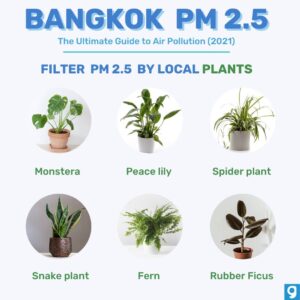
Plants are nature’s own air purifiers. And some plants are air purification experts! The three top recommended plants to keep in your house are the areca palm, mother-in-law’s tongue, and money plant.
Guri Pro Tip: We’ve been able to find all of our recommended houseplants at Chatuchak’s plant and flower market (open Tuesday from 3 pm-11 pm; Wednesday-Thursday from 8 am-5 pm), but you can probably find them at any local plant shop or one of Bangkok’s best plant markets. They’re so cheap why stop at buying one? Buy some for your home, your office and even your children’s classrooms!
6. Reduce outdoor activities
When the reported air quality levels are above moderate, everyone – regardless of age or sensitivity – should try to stay indoors as much as possible to minimize the risk of exposure to harmful pollutants.
It can be frustrating to try to maintain an active lifestyle when you’re restricted to staying indoors. Luckily, Bangkok has indoor gyms in nearly every major neighborhood and a growing number of fun indoor activities for a variety of age levels and interests.
Guri Pro Tip: Stay safe, protect your health and still maintain your fitness levels by signing up for a gym membership close to your workplace or house. If you want to prevent boredom try joining several different indoor fitness activities to add more variety to your routine and to regularly change your “indoor scenery.”
7. Eat a variety of foods high in antioxidants
Greater exposure to air pollution equals a greater amount of free radicals in the body. Free radicals are molecules that cause cell damage which can lead to illnesses and health complications.
Antioxidants are compounds that act to neutralize free radicals and lessen their effects in the body. Antioxidants are produced by our bodies but can also be found naturally in certain foods. People living in more polluted areas should ingest more natural antioxidants to help balance out the negative effects of the pollution on your body.
Guri Pro Tip: The safest and best antioxidants are those found from natural food sources versus artificial or synthetic antioxidants. One evidence-based article we found suggests these top 12 antioxidant-rich foods to regularly include in your diet: dark chocolate, pecans, blueberries, strawberries, artichokes, goji berries, raspberries, kale, red cabbage, beans, beets and spinach.
8. Protect your mental health and well being
Air pollution has recently been found to be one environmental factor that may affect mental health. Some studies show a strong correlation between air quality and cognitive function, which means air quality could be a cause of mental illnesses.
It’s always a good idea to regularly assess your mental health and to take steps in your life to increase your mental wellbeing. This might be even more important when you live in a highly polluted area.
Guri Pro Tip: Some of our favorite ways to increase mental wellbeing and ensure positive mental health are to exercise regularly, practice meditation, and see a mental health professional or therapist at least a few times a year.
What You can do about Air Pollution
We’ve all seen, and probably laughed at, the fire trucks spraying water into the air around Bangkok. It might seem illogical, but then what actions did you take that same day to prevent or reduce air pollution? A fire truck spraying water is better than nothing… right?
Decreasing the air pollution will require tangible concentrated efforts, not just by the government, but also by the citizens and denizens of Bangkok.
Do your part to stop air pollution with these simple but effective lifestyle changes:
- Take public transportation as much as possible. The biggest cause of air pollution is the burning of fossil fuels. Besides factories, this means that on an individual level your car is one of the main offenders. The fewer people on the roads the better.
- If you do drive, don’t drive alone. Share rides and carpool whenever you can even if your family has the means not to; so if you and your family have several vehicles challenge yourselves not to use all of the cars every day.
- Drivers of Bangkok, we beg you, please don’t idle. A lot of Bangkokians leave their parked cars on to run the air conditioner while they wait in parking lots or wait to pick someone up. Not only is it actually bad for your car, but idling also puts a lot of carbon dioxide into the air while you wait. Our rule of thumb? If your car is not moving the engine should be off.
- At home, turn off your lights, try not to use the aircon too much, and unplug your appliances to reduce your energy consumption. Stop wasting energy produced by power plants that mostly run on fossil fuels (the primary offender of air pollution).
- Share the knowledge with your family and friends. Help spread awareness about air pollution, its causes and its harmful effects so we can all work together towards a solution for our planet and for our own health.
You may not be able to control some of the main sources of air pollution, like factories and all of the cars on the road. But you can take responsibility for your own actions and choose to make small lifestyle changes so that, at the very least, you’re not adding to the air pollution problem.
But think about what would happen if each of us committed to making these changes in our lives: our actions collectively could help reduce the problem and create a cleaner atmosphere for all of us. To paraphrase one eco-warrior quote, we don’t need a handful of people doing it perfectly. We need millions of people doing it imperfectly.
It is our sincerest hope that, just maybe, one day this article will be obsolete because we all worked together to make the air cleaner, fresher and more breathable. Until that day, stay safe and stay healthy.
Health Resources
People
Bio: Laura Martin is a certified nutrition coach and gut health specialist. Drawing inspiration from her own journey with health and happiness, Laura has designed her Healing to Happy Programs to empower people through a combination of science, mindset, and tools. Ditch the fads, become an expert of your own health and heal your way to happiness with Laura.
Bio: Mickey Allapach Na Pombhejara, aka Coach Mickey, specializes in strength and conditioning and is also an Australian Weightlifting Federation coach. The Healthy Getaway Program is an online platform where Coach Mickey offers fitness and health advice. The HG Program also hosts regular health workshops around Thailand and operates the Healthy Getaway Thailand fitness retreats. Hit up Coach Mickey to take your workouts to the next level.
Bio: Michael Carrano, aka Kru Mike, is a Bangkok entrepreneur, one of the founders of Guri and an all-around fitness and wellness buff. Kru Mike and the Guri family are on a mission to help build healthy communities around the world starting with Bangkok. Whether you’re a workout beginner or a fitness pro, Kru Mike can help you on your journey to achieve a variety of health and fitness goals.
Places
Bio: BodyConscious is a health center with a team of medical and wellness practitioners that creates tailored lifestyle programs designed around each client’s current biology, psychology, environment and lifestyle. The BodyConscious philosophy is based on four simple principles: root causes, natural solutions, tried and tested therapies and lifestyle improvements and personal empowerment. Discover the root causes of your health challenges, alleviate or reverse your condition and begin your path to whole-body health and happiness with the BodyConscious team.
Bio: With over 280 gyms worldwide open 24/7, including 11 locations in Bangkok, Jetts Fitness is the gym designed for everyday, busy people to still get the results and achieve the fitness goals they want. Jetts Fitness is built on the mantra that working out should be on your terms. At Jetts you can squeeze in a workout any time throughout your busy work week or packed-out weekend. Jetts Fitness also offers no lock-in contracts honoring their commitment to keep their gyms simple, convenient and flexible.
Bio: New Counseling Service (NCS) has been offering counseling and mental health services in Bangkok for more than twenty years. NCS’s counseling team includes certified professionals from a variety of cultural backgrounds. If you’re dealing with any kind of mental health issue from anxiety or depression to grief or eating disorders, the NCS counselors are ready to help you on your journey to greater mental health and wellbeing.
Products
- Travellight Breathing Mask: Equipped with an N95 filter with inner activated carbon layers, the Travellight Breathing Mask effectively filters out PM2.5 particles and other pollutants for the advanced breathing protection you need. These masks are lightweight and easy to breathe in because of the one way air valves which release hot exhaled air. Great for both indoor and outdoor use, you can order your Travellight Breathing Mask on LINE (@breathingmask) or Facebook (@travellightmaks).
- Best Air Purifiers in Bangkok: The air inside your home probably still has PM2.5 in it! Make your home PM2.5 free with this list of the best air purifiers to buy in Bangkok.
- ClassPass Bangkok: ClassPass is taking the workout world by storm. Instead of paying high fees for one gym membership, ClassPass saves you 70% off drop-in rates and lets you try classes at gyms, fitness studios and more worldwide. Choose the classes you love and explore new ways to workout without worrying about gym fees and membership commitments.
Spread the Voice
Go ahead and share this article with your friends & family to help them in this battle with air pollution! Simply click on the Facebook or Twitter icons on the top left of this article!
Article References
At Guri, we live and work in Bangkok. A lot of the knowledge in this article is from firsthand experience. Some sections required further research and we’d like to give credit to the following sources for sharing their knowledge with us so that we could help further spread the information on air pollution and how to protect yourself:
- The Coal Hard Truth About Air Pollution, Infographic by Greenpeace
- Air Pollution Damages More Than Lungs: Heart And Blood Vessels Suffer Too
- Feel tired with the pollution: Get a mask!
- The impact of PM2.5 on the human respiratory system
- The Complete Guide to Air Pollution in Bangkok: PM2.5, Air Purifiers, Masks, and More
- Free radicals, antioxidants and functional foods: Impact on human health
- How do free radicals affect the body?
- Environmental pollution is associated with increased risk of psychiatric disorders in the US and Denmark


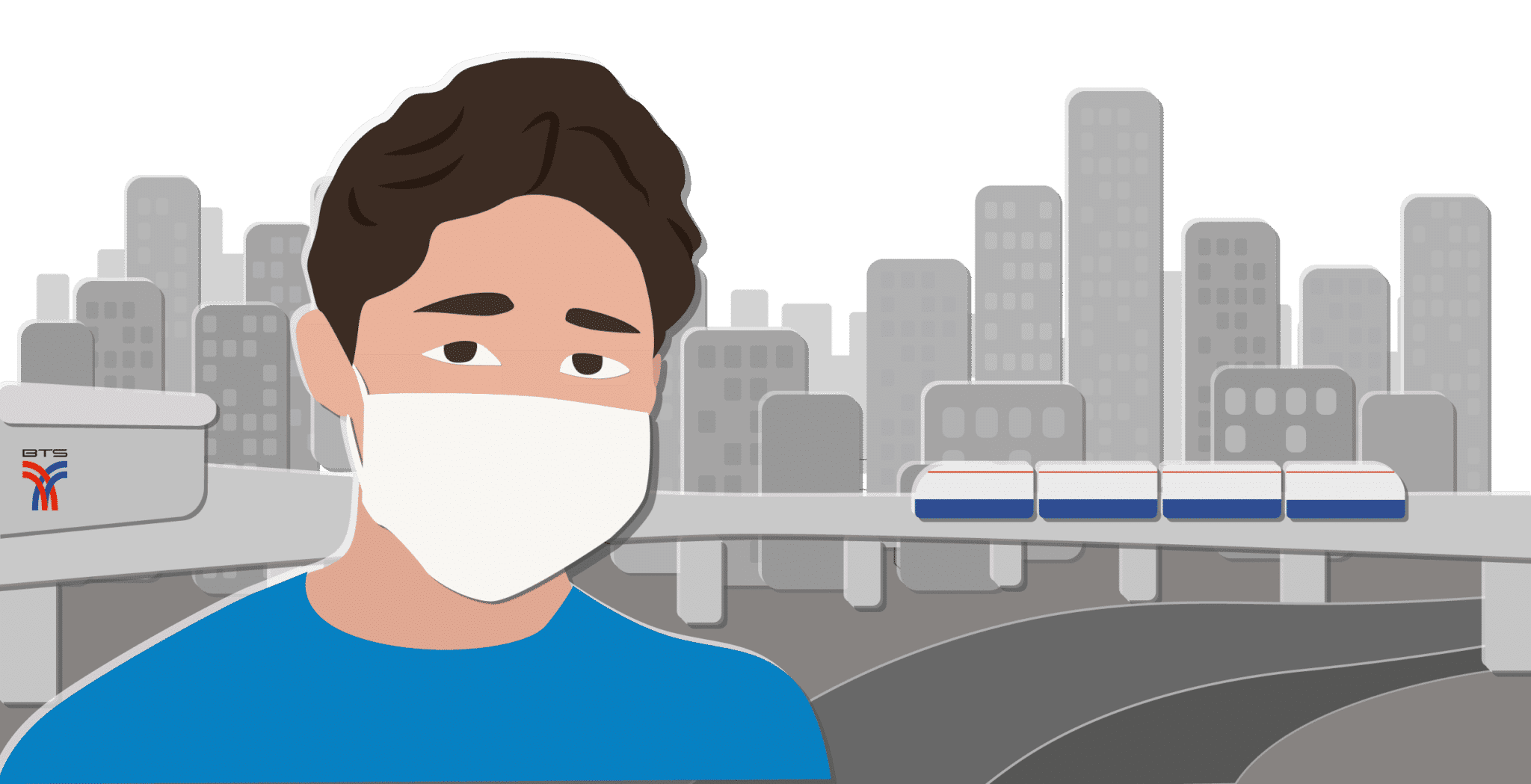
Responses